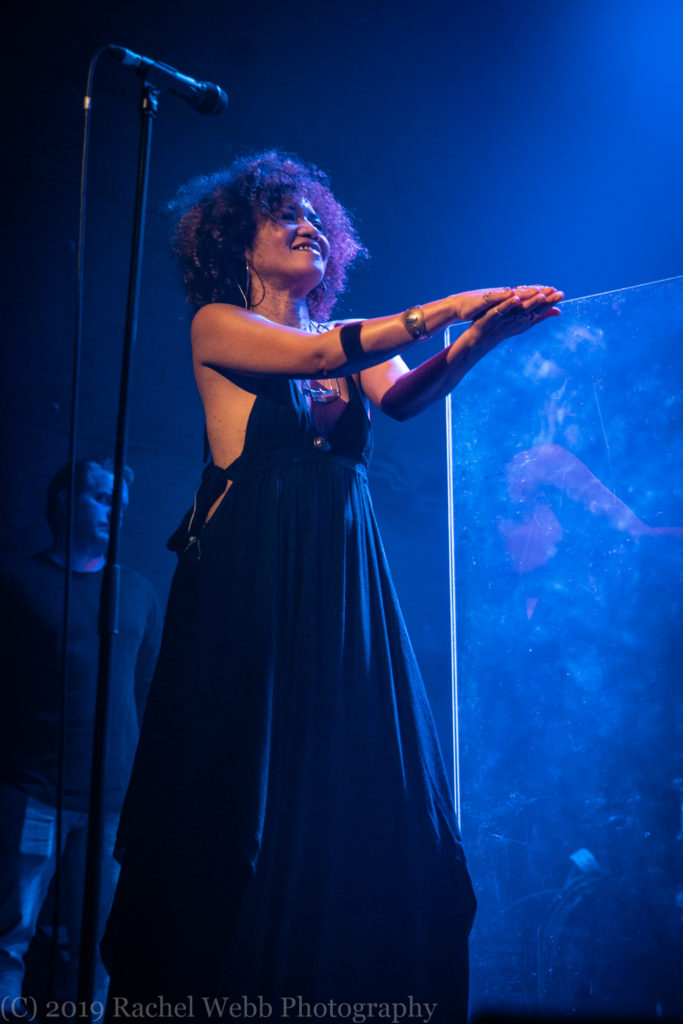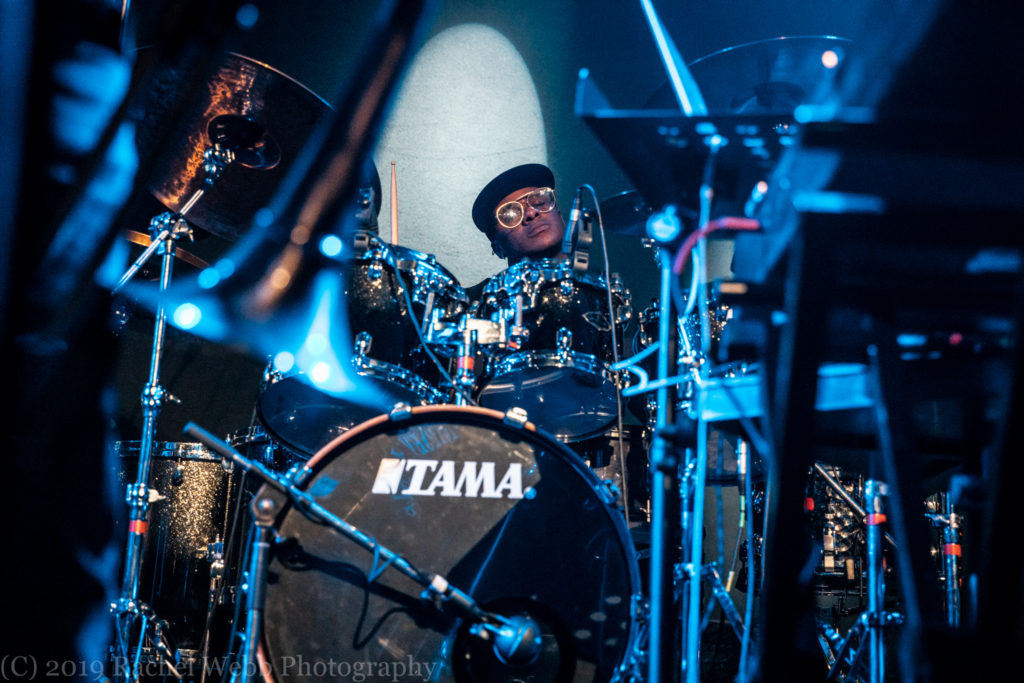Concert Review: Kamasi Washington – Powerstation, October 10, 2019
Kamasi Washington returned to Auckland last night alongside a group of remarkable musicians, performing a flawless, two-hour set at Powerstation that weaved his unique jazz mastery through a narrative of love and celebration.
Auckland’s Powerstation was filled with a wonderfully respectful and grateful audience last night, with a consistently calm and appreciative atmosphere from start to finish. With the crowd pleasantly buzzing and grooving along to the background music of Marvin Gaye and James Brown, the Powerstation stage was an impressively complex sight – two large drum kits dominating either side, with a large acoustic shield stretching from the left side of the stage toward an impressive upright bass and a scattering of microphone stands.
 Kamasi Washington is known for his incredible talent on the tenor saxophone, which Auckland fans were treated to last year and clearly eager to hear more of last night. Within a few seconds of taking to the stage with his group of supporting musicians, it was clear that the lack of opening act was a carefully considered choice. Not only did the set stretch beyond two hours, but Washington’s flavour of jazz is so immensely personal and emotional that to add any other group beforehand would have dulled the beauty of that experience.
Kamasi Washington is known for his incredible talent on the tenor saxophone, which Auckland fans were treated to last year and clearly eager to hear more of last night. Within a few seconds of taking to the stage with his group of supporting musicians, it was clear that the lack of opening act was a carefully considered choice. Not only did the set stretch beyond two hours, but Washington’s flavour of jazz is so immensely personal and emotional that to add any other group beforehand would have dulled the beauty of that experience.
“Good evening Auckland we’re back. You all good? You look good,” Washington spoke to the joyful Powerstation crowd in his smooth and humbling voice, “I’m ready to have some fun, you ready to have some fun?”
And oh did he deliver on that promise.
 Opening with Street Fighter Mas, Washington’s stunning sax sound filled the room alongside the grimy, swamp-funk bass of Miles Mosley, while lead vocalist, Patrice Quinn, grooved along on the edge of the stage. How could she – or anyone else in the building – not do so? The opening few minutes of their performance set the tone and the musical standard for the rest of the set; music that hits your soul with such force that you wouldn’t notice you were holding your hand against your chest as Quinn was.
Opening with Street Fighter Mas, Washington’s stunning sax sound filled the room alongside the grimy, swamp-funk bass of Miles Mosley, while lead vocalist, Patrice Quinn, grooved along on the edge of the stage. How could she – or anyone else in the building – not do so? The opening few minutes of their performance set the tone and the musical standard for the rest of the set; music that hits your soul with such force that you wouldn’t notice you were holding your hand against your chest as Quinn was.
The group continued through gentle rises in tempo, with the drumming duo of Ronald Bruner, Jr. and Robert Miller opening the floor to a breathtaking trombone performance by Ryan Porter. This opening number – the first of six, epic jazz pieces – showcased the individual talent of each musician, each of them listening to the others with the same enamoured attention shown by the audience.
Their next song, Journey, opened with Washington’s slow, delicate sax, each note piercing through an entirely silent and awe-inspired room. To capture an audience in that way, to dictate their contribution of applause and cheering with the same expert precision as your performance, was truly rare and put rightful attention to the talent on stage. The dreamy, ethereal keys of Brandon Coleman led into another soft rattle of drums, blending seamlessly into a funky, upbeat jazz groove.
 Quinn’s voice was filled with pure and unfiltered joy, followed with a flourish of keys by Coleman that captured the same frantic, genius energy of any legendary classical pianist. Meanwhile, Washington stood on stage with his eyes closed, listening with intense pleasure just as the crowd were. This was music designed to be felt, not just listened to – everything seemed to drift away as the song dove into a playful, swing-meets-big-band piano scale. This may have been labelled as jazz, but it wasn’t constricted or confined to the genre – it was simply music that made your heart dance, and just so happened to be closest to jazz as a musical genre.
Quinn’s voice was filled with pure and unfiltered joy, followed with a flourish of keys by Coleman that captured the same frantic, genius energy of any legendary classical pianist. Meanwhile, Washington stood on stage with his eyes closed, listening with intense pleasure just as the crowd were. This was music designed to be felt, not just listened to – everything seemed to drift away as the song dove into a playful, swing-meets-big-band piano scale. This may have been labelled as jazz, but it wasn’t constricted or confined to the genre – it was simply music that made your heart dance, and just so happened to be closest to jazz as a musical genre.
A master of dialling everything back on stage to near-silence, letting a single note ring out into a hushed room, then delivering a sweeping and grand saxophone solo, Washington showed his stunning control of his instrument as the song moved to a close, with heavy, forceful piano chords raising the tempo slightly before dropping down in Washington’s soft, sunset saxophone.
 Shortly before the third number, Abraham, Washington introduced another musician to the crowd – “the man who taught me everything I know: my dad” – Rickey Washington, who swapped between soprano saxophone and flute throughout the remainder of the set. But Abraham was initially the vehicle to showcase the upright bass of Miles Mosley, combining the beautiful bends of bass with his raw and powerful vocals. With the on-stage band now complete, Abraham and following number, Truth, brought an endless string of complementary performances, all tied together with perfectly timed drums. Rickey Washington’s soprano saxophone bled into the wild finger-picking of Mosley’s bass, flooding the venue with a distorted warmth that wouldn’t be blinked at in a Led Zeppelin or Pink Floyd solo.
Shortly before the third number, Abraham, Washington introduced another musician to the crowd – “the man who taught me everything I know: my dad” – Rickey Washington, who swapped between soprano saxophone and flute throughout the remainder of the set. But Abraham was initially the vehicle to showcase the upright bass of Miles Mosley, combining the beautiful bends of bass with his raw and powerful vocals. With the on-stage band now complete, Abraham and following number, Truth, brought an endless string of complementary performances, all tied together with perfectly timed drums. Rickey Washington’s soprano saxophone bled into the wild finger-picking of Mosley’s bass, flooding the venue with a distorted warmth that wouldn’t be blinked at in a Led Zeppelin or Pink Floyd solo.
Truth gave the crowd the first moment of insight into how beautiful Washington’s view on the world is, and a chance to witness each musician building on separate melodies to create a fluid, rhythmic sound:
“I wrote Harmony of Difference (his 2017 EP) to remind everyone how beautiful you all are. I don’t need to know you, see you, believe the same things or speak the same language to love you, but I love you. The people on this planet aren’t something to be tolerated, they’re something to be celebrated. We’ll now play five melodies at the same time to show how beautiful this world can be when we all come together.”
 This was followed by one of the funniest, and heartfelt, stories I’ve heard on stage, of how Washington met his two drummers and how the universe brought them together at various times. This earnest and genuine moment led to a drum conversation between the two, with each drummer gently building on the beat of the other into a manic and brilliant climax.
This was followed by one of the funniest, and heartfelt, stories I’ve heard on stage, of how Washington met his two drummers and how the universe brought them together at various times. This earnest and genuine moment led to a drum conversation between the two, with each drummer gently building on the beat of the other into a manic and brilliant climax.
The closing numbers, Will You Sing and Fists of Fury, cemented the admiration and respect these musicians have for each other – a shared sense of magic in creating something exquisitely beautiful, demonstrating community and love for each other at its finest. Fists of Fury served as a fitting finale to the set, with Mosley’s string bow performance on bass complementing the quick-fire notes of the sax and the rapid drumming. Building toward a grand finish with remarkable depth in their unified sound, Washington’s closing saxophone solo was complex, flawlessly performed and danced between bursts of energy and incredibly peaceful control.
Thanking the crowd for their appreciation and in always making them feel loved and welcome, Washington promised the crowd they would return, and soon. For me, and no doubt every other member of the audience, that day cannot come soon enough.
Click any photo to browse a gallery from Rachel Webb Photography.
Kamasi Washington Band
Kamasi Washington – tenor saxophone
Rickey Washington – flute, soprano sax
Miles Mosley – bass
Ryan Porter – trombone
Brandon Coleman – keyboards
Patrice Quinn – lead vocals
Robert Miller – drums
Ronald Bruner, Jr. – drums
Kamasi Washington Setlist:
Street Fighter Mas
Journey
Abraham
Truth
Drum Conversation – Ronald Bruner, Jr. and Robert Miller
Will You Sing
Fists of Fury
- The Dead South – Powerstation: April 5, 2024 (Concert Review) - April 6, 2024
- Queens of The Stone Age – Spark Arena: February 29, 2024 (Concert Review) - March 1, 2024
- Dune: Part Two – Dir: Denis Villeneuve (Film Review) - February 29, 2024
